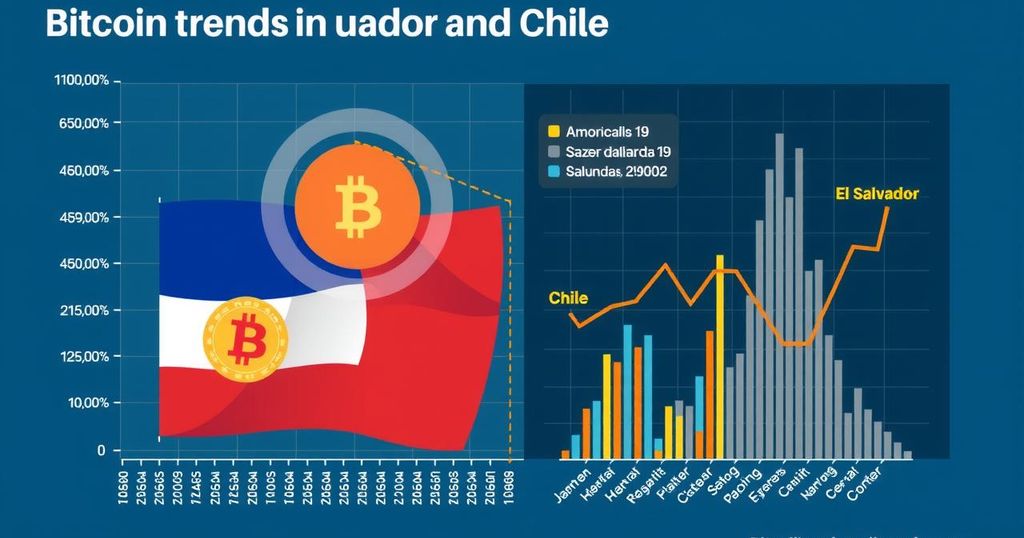This edition of Latam Insights covers El Salvador’s interest in purchasing DOJ-seized bitcoin and Chile’s proposed plan to establish a bitcoin bench in Congress. Additionally, insights from Santander US Capital Markets document the boost in tourism linked to El Salvador’s bitcoin policies, reflecting the economic benefits of cryptocurrency adoption in these regions.
This week’s edition of Latam Insights provides critical insights into the evolving cryptocurrency landscape in Latin America. In a notable move, El Salvador’s President Nayib Bukele has expressed interest in acquiring bitcoin seized by the U.S. Department of Justice (DOJ) as a strategic opportunity to enhance the country’s reserves. Meanwhile, Chile is positioning itself to embrace cryptocurrency more actively by proposing the establishment of a bitcoin bench in Congress, aimed at advancing regulatory measures and research on cryptocurrency. Moreover, recent reports from Santander US Capital Markets reveal that El Salvador’s adoption of bitcoin has significantly contributed to a surge in tourism, illustrating the tangible benefits of the country’s innovative policies regarding cryptocurrency.
El Salvador has announced its intention to purchase bitcoin that has been confiscated by the U.S. DOJ. President Nayib Bukele recently hinted on social media at the possibility of acquiring some of the seized bitcoins at a discounted price, following discussions of a federal judge permitting their sale. Bukele has been proactive in acquiring bitcoin amid price fluctuations; on January 8, he reported purchasing 11 additional bitcoins, indicating his commitment to enhancing El Salvador’s bitcoin reserves.
In Chile, there is a growing movement to transform the country’s approach to cryptocurrency, with legislators advocating for a bitcoin bench within Congress to spearhead research and regulation efforts. About 20 lawmakers are contributing to this initiative, which seeks to position Chile as a leader in cryptocurrency adoption and regulation in Latin America and beyond. Supporters are actively working to implement proposals that include creating a strategic bitcoin reserve by 2024 and advancing legislative support for bitcoin initiatives this year.
Additionally, a report by Santander US Capital Markets has highlighted the positive impact of El Salvador’s bitcoin policies on its tourism sector. According to this report, the proactive stance of the country’s government towards integrating bitcoin into its economic structure has led to record numbers in tourism, emphasizing the potential economic advantages of adoption. The Bitcoin Office has proudly declared El Salvador as the “Bitcoin Country,” underscoring the measurable effects that these policies have had on tourism figures.
In conclusion, the developments within El Salvador and Chile indicate a shift towards embracing cryptocurrency in Latin America. El Salvador’s interest in acquiring DOJ-seized bitcoins, along with Chile’s legislative efforts to establish a crypto-friendly environment, reflects a broader trend of recognition of bitcoin’s potential economic benefits. The insights provided by Santander further reinforce the argument that innovative cryptocurrency policies can yield significant positive impacts, such as increased tourism, thereby making a strong case for further regulation and adoption within the region.
The landscape of cryptocurrency in Latin America is gaining momentum, with El Salvador leading the way in adopting Bitcoin as legal tender. The U.S. Department of Justice (DOJ) has seized substantial amounts of bitcoin from illegal operations like the Silk Road, creating unique opportunities for state actors interested in bolstering their reserves. El Salvador’s proactive approach has been recognized globally, raising questions about other countries like Chile, which is contemplating strategic cryptocurrency initiatives. The economic implications of cryptocurrency adoption are becoming evident, especially as studies reveal its effect on tourism.
In summarizing the key developments in cryptocurrency within Latin America, El Salvador’s significant advancements illustrate a forward-thinking approach to incorporating digital currency into its economic framework. The discussions around the DOJ’s seized bitcoins may present a unique opportunity for the nation to expand its reserves. Concurrently, Chile’s initiative to create a legislative platform for bitcoin regulations signifies an emerging acknowledgment of cryptocurrency’s relevance. Moreover, the positive correlation between El Salvador’s bitcoin adoption and increased tourism underscores the potential economic advantages for countries willing to embrace this transformative financial technology.
Original Source: news.bitcoin.com






